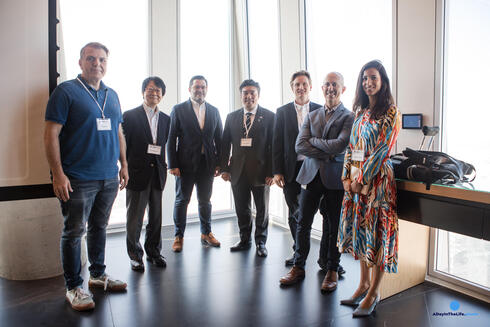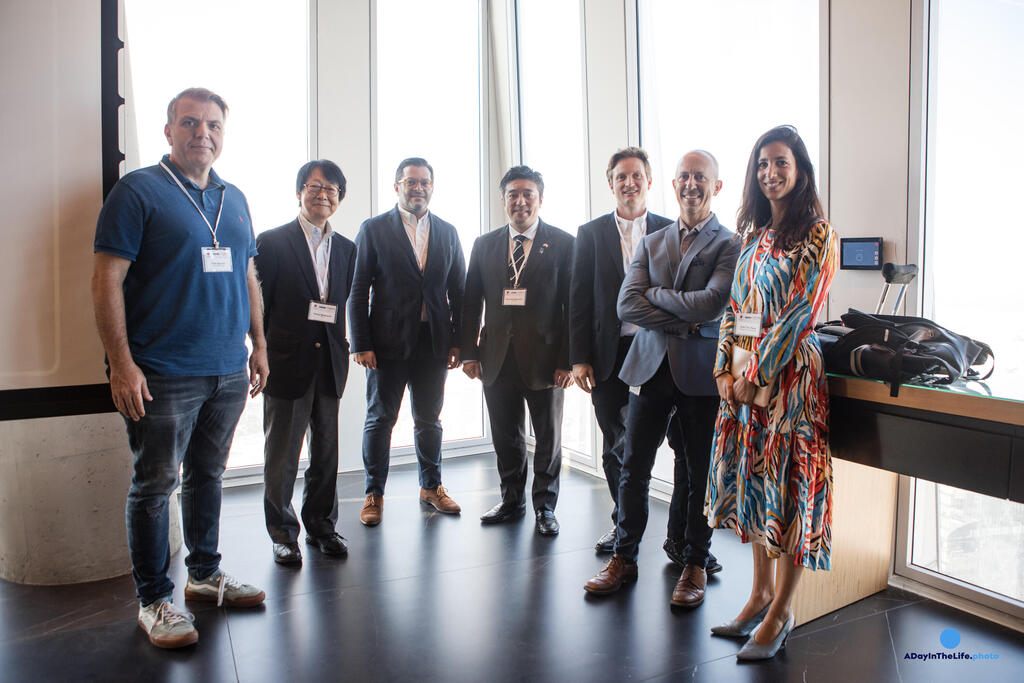
Annual Israel-Japan event mourns Shinzo, praises relations between the two nations
Big In Japan was hosted by SOMPO Digital Lab Tel Aviv, Aristagora VC, and held at the Pearl Cohen offices.
The fourth annual “Big In Japan” event, hosted to celebrate technology and business opportunities between Israel and Japan, was held this week at the offices of Israeli law firm Pearl Cohen. The event was divided into sections that included opening remarks from Ambassador of Israel to Japan Gilad Cohen and Ambassador Extraordinary and Plenipotentiary of Japan to Israel Mizushima Koichi, and a fireside chat with former deputy defense secretary Yasuhide Nakayama and Daniel Kolbar, Head of Israel’s Economic and Trade Mission in Japan. The end of the event saw two panels with leading investors and entrepreneurs from both countries.
Much of the event was sharing the grief for Former Japanese Prime Minister Shinzo Abe, who many praised for the healthy strength of Israel-Japanese relations that was formed during his time in office. “Shinzo was an architect of modern Japan, under him 60 agreements were signed between Israel and Japan,” said Ambassador of Israel to Japan Gilad Cohen, who joined via a Zoom link from Tokyo. “Many of the things we do today are thanks to him.”
1 View gallery


Right to left: Anat Tila Cherni, Yinnon Dolev, Daniel Kolbar, Yasuide Nakayama, Guy Lachman, Tetsuji Madarame, and Eyal Agmoni
(Photo: Eduardo Feldman)
Relations between Japan and Israel have been steadily increasing ever since Prime Minister Shinzo Abe’s visit in 2015. In 2021, Japanese companies invested roughly $3 billion into the Israeli tech ecosystem, accounting for roughly 15% of its total investment. “Abe was truly a friend of Israel,” affirmed Ambassador Extraordinary and Plenipotentiary of Japan to Israel Mizushima Koichi to the crowd. “Before that watershed in 2015, the number of Japanese companies in Israel was below 30. Today it is 85.”
Recent years have seen the two nations experience somewhat of an expected business romance: Startup Nation, known for its nimble and sometimes clumsy innovation among young startups, can easily complement the large and long-term thinking that Japanese enterprises apply to their overall corporate strategies. A common adage among the ecosystems is that Israelis are good at the “zero to one”, whereas the Japanese can take those companies “from one to one hundred.”
The fireside chat between Former Deputy Defense Secretary Yasuhide Nakayama and Daniel Kolbar, Head of Israel’s Economic and Trade Mission in Japan, touched on a variety of topics, such as the assassination of Prime Minister Shinzo Abe, the Russia/Ukraine conflict, and potential clashes with China on the topic of Taiwan sovereignty. When asked how Israeli startup investors can succeed in Japan, Nakayama highlighted Japanese shyness and encouraged Israelis to tap into their chutzpah.
“They're shy to say something and shy to approach,” he said of the Japanese. “You have to do it. The Israelis are not shy ever - do as you do normally, it helps… Please collaborate with our country. If we collaborate, we can beat every country in the world.”
The second half of the event included panel discussions that touched on investment, startup opportunities, and how to tap into the Japanese market from Israel. Moderated by Pearl Cohen Senior Partner Guy Lachmann, he spoke to Principal Fellow, DX Innovation at Nippon, Yusen Kaisha (NYK) Tetsuji Madarame, Managing Partner at Aristagora VC, Anat Tila Cherni, Founder of Chartered Group, Eyal Agmoni, and Co-founder and Managing Partner at IN Venture, Eitan Naor.
“2021 was a fantastic year in terms of tech globally, and in Israel specifically both in the private sector but both IPO and SPACs,” said Tila Cherni. Aristagora VC invests in early-stage tech companies and actively pushes its companies to enter the Japanese market. “What we have experienced in the last half year is a correction to the market. Shares have decreased 50-80%. This obviously has an impact on the private sector. While we feel this, there is still a deep demand for technology. Companies that solve real problems in the real world with real technology will still be able to earn money and grow their businesses.”
Madarame highlighted how NYK, as an old Japanese shipping company, is interested in Israeli tech that it could adopt to help reduce its Co2 emissions. “We want Israeli companies to resolve our challenges like ESG. And we are an aging nation – we need automation,” he told the crowd.
Related articles:
The final panel was moderated by SOMPO Digital Lab Israel CEO Yinnon Dolev and discussed the opportunities for startups in Japan. He was joined by Shai Lev, VP of Operations and Partnerships at Classiq; Gideon Ben Zvi, CEO of Valens; Noa Asher, CEO of NTT Innovation Laboratory Israel; and Avi Bakal, Co-founder and CEO of TriEye.
“Japan is not just different because it is East - there is Japan and then the rest of the world,” said Ben Zvi, CEO of Valens, a manufacturing company providing semiconductors for the automotive and audio-video industries. “The demand for quality is very high. They can consider many things just Beta.” Ben Zvi also stressed the importance of patience and humility for Israelis who wish to work with Japan - and that maturity is key for anyone thinking of making the jump. “ You need maturity to enter the market. There is a barrier that needs to be acknowledged, if you come with a product that is not developed it is easier to go somewhere else.”
For Asher, whose NTT Innovation Laboratory Israel is celebrating its first year, emphasis was placed on longevity. “Israelis tend to look west and not understand the value of working with Japanese corporates. There are so many opportunities and we are happy to present them… Japan is a true mind of infinite opportunities. If you find your champions in Japan it really pays off. It is a long-term relationship,” she said.














